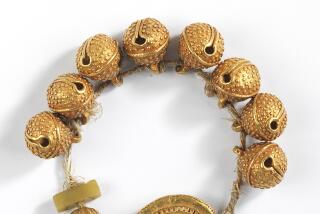Souvenir Hounds Grab Piece of Colony on Eve of History
- Share via
HONG KONG — The intersection of 155 years of history, bad taste and crass consumerism can be found in the lobby shop at the swank Grand Hyatt Hong Kong hotel. It is called “Canned Colonial Air, the last gasp of an empire.” It is an $11 can of nothing.
Since February, about 5,000 cans of “100% pure pomposity” have been snapped up by souvenir hunters seeking a unique way to commemorate the end of British dominion here, according to Guy Nicholls and John Resnick, the brains behind the high-priced gag gift.
Nicholls warns buyers to open their purchases at their own peril. “One sniff could lead to extreme arrogance, stiffening of the upper lip or worse.”
Anyone familiar with this Asian bastion of unabashed capitalism would hardly be surprised that this week’s historic changing of the guard, which will return the colony to Chinese rule, has become a marketing vehicle for everything from imperialist air and gaudy T-shirts to crystal statues and 18-carat-gold pens.
Photos of Hong Kong and a series of 1997 commemorative designs decorate telephone cards, subway tickets, coins and stamps. In May, a Hong Kong buyer paid $6,321 at a special Sotheby’s auction for ticket number 1997 for the first Shanghai-Hong Kong direct train, which pulled into the British colony on May 20.
In the waning hours of British rule, the hottest items are those produced in limited quantities, such as the black bags filled with 1997 memorabilia that were distributed to the thousands of foreign journalists dispatched to chronicle this historic moment.
Those fabric briefcases, whose contents included a color-coordinated baseball cap, polo shirt and watch, were reportedly attracting offers of $350 to $450 within hours after they hit the streets. Even the light-blue plastic press badges have been eyed for possible resale value.
In a place where speculative fever is an incurable disease, anything created in limited quantities is viewed as an investment opportunity.
Japanese tourists snapped up a crystal Baccarat sculpture depicting a reclining mother grasping the hands of a child suspended in mid-air. Only two of the 30 pieces produced are still available, for $38,850 each. A smaller version priced at $1,000 sold out quickly.
Earlier this week, Chan Mei-ling, 46, waited in line overnight to buy several uncirculated coin sets produced by the Hong Kong Monetary Authority. Priced at $18.40 each, the sets included coins decorated with flowers on one side and various commemorative designs on the other.
“I hope to make a little profit if I sell these in a few years, but they make a good souvenir too, so I won’t be too upset if the price doesn’t go up,” she said.
At the Casablanca Shop, Joe Chow’s best-selling hand-over souvenir is a black Chinese-made Hero pen with gold engraving. He said he has sold several hundred of these pens at $45 apiece, mostly to Americans looking for early Christmas gifts.
His sales pitch: “This is likely to be the pen used in the signing ceremony” between Britain and China.
Chow already sold out his inventory of the more expensive mother-of-pearl Hero pen. But for the real collector, he still has some $3,400 Caran d’Ache HK 1997 pens with 18-karat-gold Chinese lettering and a crown of 50 glittery zircons.
The Hong Kong government hopes to expand its coffers with the sale of 27 surplus British-era postal boxes. In one auction, similar boxes sold for between $700 and $3,450. Friday was the last day for bids.
*
Not all 1997 goodies are flying out the door. Shop clerk Katrina Chau has not been able to sell her last silver Christofle statue, titled “Hand in Hand.” That statue, depicting a handshake between China and Hong Kong, is labeled No. 4, considered an unlucky number by the Chinese because the word for four sounds the same as the word for death in Chinese.
On Temple Street, the colorful night market not too far from Hong Kong’s largest mosque, the commemorative paraphernalia is more predictable and a lot less pricey.
For $8.50, you can pick up a watch featuring a smiling Deng Xiaoping, China’s late “paramount leader.” Just $2 buys a key chain decorated with the bauhinia, the official flower of China’s new Special Administrative Region--Hong Kong’s designation after the hand-over--or the pink dolphin, the endangered creature that has become one of Hong Kong’s newest mascots.
But early Saturday evening, the Temple Street market was unusually quiet. Vendor Chi Ching Or, sitting in front of a large display of colorful T-shirts, emblazoned with 1997 slogans, blamed the transition for his lackluster sales.
“People are nervous,” he said. “Maybe business will get better after the hand-over.”
More to Read
Sign up for The Wild
We’ll help you find the best places to hike, bike and run, as well as the perfect silent spots for meditation and yoga.
You may occasionally receive promotional content from the Los Angeles Times.






